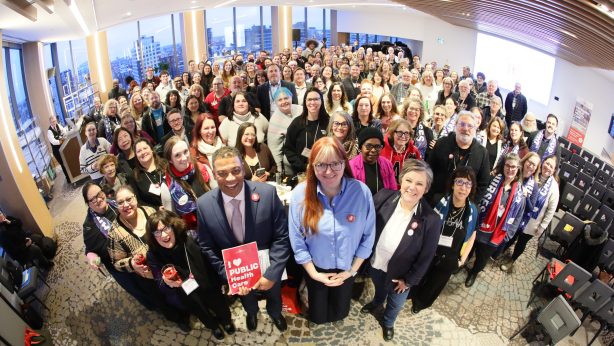“A deterioration of care to allow private care to expand,” says health minister
This week’s edition of who is saying what about public health care is compiled by Pat Van Horne.
Health minister denounces privatization
“Let me be very clear, Canada and Canadians are deeply proud of having a public health-care system… We know that not only is it a deterioration of care to allow private care to expand, but it really has a huge injurious impact on costs as well. It’s way too expensive,” said Federal Health Minister Mark Holland, to Global News, January 21, 2024
Public pharmacare program would provide coverage for all Canadians, regardless of age, occupation, or income
“More than half of working-age Canadians are millennials or Generation Z. Yet, they seem to be overlooked in discussions about national pharmacare. Many Canadians in their 20s and 30s currently struggle with prescription costs and the burden of private insurance premiums. If national pharmacare relies on costly private drug plans, it will make those struggles worse. . . Here’s the facts: one in five Canadians has no coverage for the prescriptions they need. One in ten Canadians skip prescriptions they have been written because they cannot afford the out-of-pocket costs. Over a million Canadians have to either sacrifice basic needs like food, or borrow money from family and friends to pay for their prescription drugs. . .What you may not know is that Canadians under 40, particularly part-time workers, immigrants, and people of colour, are disproportionately affected by these injustices in our patchwork of private and public drug plans. The growing gig economy is part of the reason,” write Steve Morgan, economist and professor of health policy at the University of British Columbia, Mael Houck and Haleema Ahmed, alumni of the Prime Minister’s Youth Council, The Hill Times, December 13, 2023
Only four provinces have bilateral health agreements with Ottawa after almost one year
“We want the federal funding to become available as soon as possible… But we know that this work takes time. It requires the provinces to really have solid plans in place to move forward. And it also requires them and the federal government to come together and jointly agree on outcomes that they want to see. And so I think we would rather see it done right than quickly,” said Tim Guest, CEO of the Canadian Nurses Association, in The Hill Times, January 22, 2024
Manitoba nurses hopeful that new program will recruit and retain nurses
“We hope this announcement will assist in recruiting and retaining nurses to enter and remain in the public system and stem the tide of public money spent on for-profit health care . . . This announcement, we hope, is one that takes that for-profit investment and puts it back where it belongs, which is into the public system. . .Whether that be money allocated to better training or education, money spent bolstering supports for mental health or money spent to retain or recruit all the Manitoba nurses we can is a move in the right direction,” said Manitoba Nurses Union president Darlene Jackson, to the Winnipeg Free Press, January 22, 2024
Canadian Federation of Nurses Unions wants a sustainable staffing plan
“As the health-care crisis rages unabated across the country, nurses are being pushed to work more overtime than ever before, with some working as long as 24 hours continuously. . .During the span of only five months of 2023, the Northern Regional Health Authority (NRHA) reports that nursing staff worked a total of 32,816 overtime hours. Without a sustainable staffing plan, the use of private nurse agencies is also skyrocketing. The NRHA spent $2.5 million on for-profit agencies in just one month last year,” wrote Manitoba Nurses Union President Darlene Jackson and the Canadian Federation of Nurses Unions President Linda Silas, in the Winnipeg Free Press, January 22, 2024
Non-profit nursing homes still under threat in New Brunswick
“Since 2008, the corporatization of nursing homes has occurred because of the government’s adoption of the public-private partnership (P3) model. In addition to that factor, the adoption of competitive bidding through a Request for Qualifications/Request for Proposals (RFQ/RFP) model, has been in place since 2015… Traditional locally-based not-for-profit nursing homes struggle for survival and to meet the requirements of the new model. . .A local nursing home could never win in a competitive bidding process without substantial financial backing… Unfortunately, this would be the case for almost all of the remaining traditional locally-based not-for-profit nursing homes in New Brunswick,” wrote Joan McFarland, long-term care researcher and retired economics professor, in the NB Media Co-op, January 22, 2024
Federal dental care program a first step to universal access
“We have always been clear that this is a first step – a down payment – on universal access that more must be done… New Democrats will not stop until every Canadian can access the dental care they need, regardless of their ability to pay,” said NDP Federal Health Critic Don Davies (MP Vancouver Kingsway), to the Toronto Star, January 18, 2024
Ontario health care workers call for public solution to health care crisis
“We recently estimated that dealing with those pressures and bringing back the quality of care in our hospitals to an acceptable standard would require a $1.25 billion annual investment after offsetting costs of inflation. But so far, the Ford government is letting the hospitals deteriorate while it sits on $5.4 billion in contingency funding. . .If this government is serious about addressing the hospital crisis, it must commit to historic investments immediately. The auditor general’s report makes it clear that we don’t have time to waste, as hundreds of thousands of lives are at stake with people languishing on surgical wait-lists and unable to rely on emergency rooms,” wrote Michael Hurley, president Canadian Union of Public Employees (CUPE) Council of Hospital Unions, Sharleen Stewart, president Service Employees International Union (SEIU), and Anne Orr, Unifor, in the Toronto Star, January 17, 2024
Ontario moving closer to privatizing more health care services
“Our fundamental concern is that as you…expand private clinics in this province, you’ll be bleeding staff and money out of the public system and you will be putting people in situation where wait times for publicly-funded health care will become even longer . . .”As we have more and more private health-care facilities, the pressure on people to pay for unnecessary treatments, unnecessary equipment, to be upsold, is very strong,” said NDP MPP Peter Tabuns, CBC News, January 17, 2024
Support the Canadian Health Coalition



